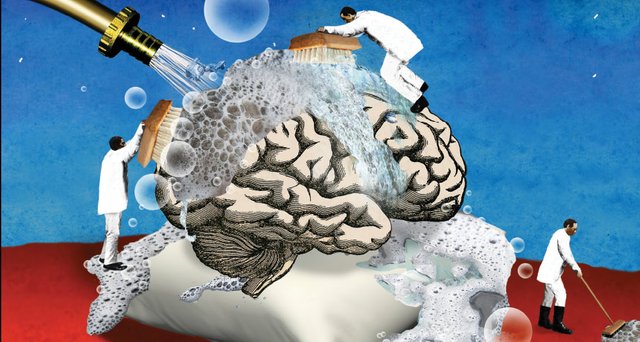The brain may clean out Alzheimer’s plaques during sleep-LAURA BEIL
Neuroscientist Barbara Bendlin studies the brain as Alzheimer’s disease develops. When she goes home, she tries to leave her work in the lab. But one recent research project has crossed into her personal life: She now takes sleep much more seriously. pic credit-MICHAEL MORGENSTERN
pic credit-MICHAEL MORGENSTERN
Bendlin works at the University of Wisconsin–Madison, home to the Wisconsin Registry for Alzheimer’s Prevention, a study of more than 1,500 people who were ages 40 to 65 when they signed up. Members of the registry did not have symptoms of dementia when they volunteered, but more than 70 percent had a family history of Alzheimer’s disease.
Since 2001, participants have been tested regularly for memory loss and other signs of the disease, such as the presence of amyloid-beta, a protein fragment that can clump into sticky plaques in the brain. Those plaques are a hallmark of Alzheimer’s, the most common form of dementia.
Each person also fills out lengthy questionnaires about their lives in the hopes that one day the information will offer clues to the disease. Among the inquiries: How tired are you?
Some answers to the sleep questions have been eye-opening. Bendlin and her colleagues identified 98 people from the registry who recorded their sleep quality and had brain scans. Those who slept badly — measured by such things as being tired during the day — tended to have more A-beta plaques visible on brain imaging, the researchers reported in 2015 in Neurobiology of Aging.
In a different subgroup of 101 people willing to have a spinal tap, poor sleep was associated with biological markers of Alzheimer’s in the spinal fluid, Bendlin’s team reported last year in Neurology. The markers included some related to A-beta plaques, as well as inflammation and the protein tau, which appears in higher levels in the brains of people with Alzheimer’s.
Bendlin’s studies are part of a modest but growing body of research suggesting that a sleep-deprived brain might be more vulnerable to Alzheimer’s disease. In animal studies, levels of plaque-forming A-beta plummet during sleep. Other research suggests that a snoozing brain runs the “clean cycle” to remove the day’s metabolic debris — notably A-beta — an action that might protect against the disease. Even one sleepless night appears to leave behind an excess of the troublesome protein fragment (SN Online: 7/10/17).
But while the new research is compelling, plenty of gaps remain. There’s not enough evidence yet to know the degree to which sleep might make a difference in the disease, and study results are not consistent.
A 2017 analysis combined results of 27 studies that looked at the relationship between sleep and cognitive problems, including Alzheimer’s. Overall, poor sleepers appeared to have about a 68 percent higher risk of these disorders than those who were rested, researchers reported last year in Sleep. That said, most studies have a chicken-and-egg problem. Alzheimer’s is known to cause difficulty sleeping. If Alzheimer’s both affects sleep and is affected by it, which comes first?
For now, the direction and the strength of the cause-and-effect arrow remain unclear. But approximately one-third of U.S. adults are considered sleep deprived (getting less than seven hours of sleep a night) and Alzheimer’s is expected to strike almost 14 million U.S. adults by 2050 (5.7 million have the disease today). The research has the potential to make a big difference.
Dream weavers
It would be easier to understand sleep deprivation if scientists had a better handle on sleep itself. The brain appears to use sleep to consolidate and process memories (SN: 6/11/16, p. 15) and to catalog thoughts from the day. But that can’t be all. Even the simplest animals need to sleep. Flies and worms sleep.
But mammals appear to be particularly dependent on sleep — even if some, like elephants and giraffes, hardly nod off at all (SN: 4/1/17, p. 10). If rats are forced to stay awake, they die in about a month, sometimes within days.
And the bodies and brains of mice change when they are kept awake, says neurologist David Holtzman of Washington University School of Medicine in St. Louis. In one landmark experiment, Holtzman toyed with mice’s sleep right when the animals’ brain would normally begin to clear A-beta. Compared with well-rested mice, sleep-deprived animals developed more than two times as many amyloid plaques over about a month, Holtzman says.
Losing sleep
Alzheimer’s disease disrupts sleep. And disrupted sleep itself might encourage Alzheimer’s by allowing buildup of amyloid-beta, or A-beta, which is thought to lead to the death of neurons. This cycle of sleep deprivation can also affect levels of the hormone melatonin, which helps the body to sleep, and can interfere with metabolism, a disruption that is also a risk factor for Alzheimer’s.
Congratulations @gauravyadav3206! You have completed the following achievement on Steemit and have been rewarded with new badge(s) :
Click on the badge to view your Board of Honor.
If you no longer want to receive notifications, reply to this comment with the word
STOPDo not miss the last post from @steemitboard:
SteemitBoard World Cup Contest - Play-off for third result
Participate in the SteemitBoard World Cup Contest!
Collect World Cup badges and win free SBD
Support the Gold Sponsors of the contest: @good-karma and @lukestokes